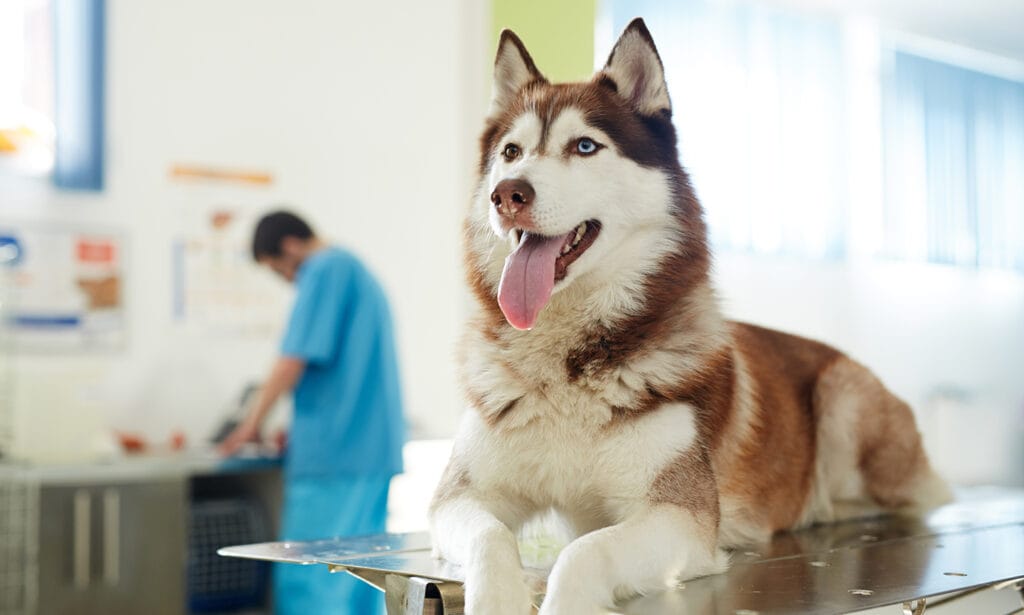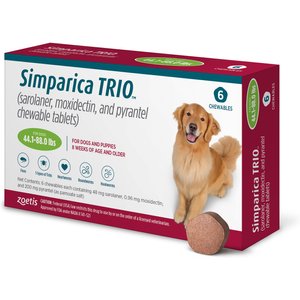Deworming in dogs involves using medications to kill worms that invade a dog’s body. We’re not talking about harmless earthworms, but rather parasites that take up residence in a dog’s intestines (and sometimes other organs), feeding on blood and nutrients they find within. Sounds like something straight out of an “Alien” movie, right?
We spoke to vet experts to understand the ins and outs of common worms in dogs and how to get rid of them. Plus, get tips for safeguarding your dog against these unwelcome invaders.
In This Guide:
What Is Deworming in Dogs?
Deworming in dogs uses medications called anthelmintics to target and eliminate parasites, such as hookworms and tapeworms, from a dog’s body.
How Do Dog Dewormers Work?
Dog dewormers contain active ingredients that target specific types of worms, says Jaclyn M. Coble, DVM, CCRP, CVA, founder of Sea Legs Integrative Veterinary Health in Boston.
“They will either paralyze the worms’ nervous systems or interfere with their ability to absorb nutrients,” she says.
After the worms are paralyzed or killed, the dog eliminates them via bowel movements.
What’s the Cost of Deworming My Dog?
The base cost of a deworming medication depends on the type of medication, the size of your dog and the severity of the infection.
Beyond the cost of the medication itself, you have to factor in other possible costs, including the cost of a fecal test to determine the type of worm or worms that your dog has, and the visit to the veterinarian.
If your dog has additional symptoms or concurrent disease, your veterinarian may recommend additional testing like blood work or X-rays.
Some dogs may get infections that become severe enough that they need to be hospitalized, which would be an additional expense.
Which Worms Are Most Common in Dogs?
According to Carol Osborne, DVM, founder of Chagrin Falls Veterinary Center & Pet Clinic in Chagrin Falls, Ohio, several types of worms can make themselves at home in dogs, including:
Roundworms
Roundworms are the most common type of intestinal parasite in dogs, especially puppies.
These long, spaghetti-like worms, ranging in color from white to light brown, infest the dog’s intestines.
They’re transmitted through ingesting contaminated feces or soil, or consuming prey like rodents or cockroaches, which are hosting the worms. They can also be passed from mother to puppy via the placenta or milk.
Many dogs with roundworms don’t display any signs during early stages of infection. However, dogs infected with a large number of roundworms may have the following symptoms:
- Pot-bellied stomach
- Weight loss
- Dull hair
- Diarrhea
- Vomiting
- Visible worms in the dog’s stool or vomit
Hookworms
Appropriately named, hookworms are equipped with sharp mouthparts they use to hook onto a dog’s intestines, and feed on tissue fluids and blood.
Dogs can contract hookworm infections by consuming infected prey or directly ingesting them from the environment (eating grass, soil, etc.). They can also be transmitted through infected milk from their mother or via larvae entering through their skin.
Because hookworms feed on blood, they can cause internal blood loss, which can be a serious threat to dogs, especially young puppies. It’s not uncommon for young pups to die from severe hookworm infections.
Symptoms of hookworms in dogs may include:
- Pale gums
- Significant weight loss
- Bloody diarrhea
- Dull and dry coat
- Failure to grow properly (in puppies)
- Skin irritation and itching
- Coughing
Tapeworms
Tapeworms are segmented parasites that attach to the wall of a dog’s small intestines.
There are several types of tapeworms, but the most common species in dogs is Dipylidium caninum, which a dog can get by eating an infected rodent or accidentally ingesting infected fleas found on their body.
Adult tapeworms can reach lengths up to 11 inches, but segments break off from the main body and pass in the dog’s feces.
Symptoms of tapeworms in dogs may include:
- Visible mobile white segments (about ½ inch long) in the dog’s feces or around the anus
- Visible immobile white/tab segments that look like grains of rice in the dog’s feces or around the anus
- Scooting (when your dog drags their bottom on the ground)
- Stunted growth (in puppies)
- Anemia (typically only seen in puppies)
- Intestinal blockage
Whipworms
Whipworms are tiny parasites (about ¼ inch long) that can cause inflammation of a dog’s large intestine.
Whipworm eggs are shed in the dog’s feces and can survive in the environment for up to five years, opening the door for another dog to ingest them.
Symptoms of whipworms in dogs may include:
- Chronic diarrhea (with or without blood)
- Weight loss
- Straining to poop
- Decreased appetite
- Anemia
Heartworms
Heartworms are different from all the other worms on this list.
After entering a dog through the bite of infected mosquitoes, heartworms travel through blood vessels to the dog’s heart and lungs, where they can cause severe damage.
Heartworm disease can be fatal if left untreated.
Heartworms pose the greatest risk in regions with consistently warm weather year-round, where mosquitoes flourish, such as in the southern United States. However, all dogs, regardless of their location, are susceptible to this parasite.
Many dogs show few or no symptoms in the early stages of heartworm infection. But the longer the infection persists, the more likely symptoms will develop.
Symptoms of heartworms in dogs may include:
- Mild, persistent cough
- Reluctance to exercise
- Fatigue after moderate activity
- Decreased appetite
- Weight loss
- Swollen belly (due to excess fluid in the abdomen caused by heart failure)
How Do I Deworm My Dog?
Deworming your dog involves administering anthelmintics to eliminate the worms from your dog’s body.
Before starting any deworming treatment, consult your veterinarian. They can assess your dog’s health; determine if deworming is necessary; and recommend the most appropriate deworming protocol.
Either you or your veterinarian will administer the dewormer. If you’re doing it yourself, carefully follow the instructions provided by your veterinarian or on the dewormer packaging. Make sure you give the correct dosage based on your dog’s weight.
Depending on the severity of the infestation and your vet’s recommendations, you may need to repeat the deworming treatment at regular intervals.
Types of Deworming Medicine for Dogs
Most dog worming medications come in tablet or chewable form and are given by mouth, but they can also come as powder that’s added to food, liquid suspensions or topical treatments. There are two main categories of dewormers for dogs, including:
- Broad-spectrum dewormers: These medications often contain multiple active ingredients and are designed to treat a wide range of common parasites in dogs, including roundworms, hookworms, whipworms and tapeworms.
- Targeted dewormers: These medications typically contain a single active ingredient and focus on treating one specific parasite. They’re useful when a dog is diagnosed with a specific worm infection.
Dewormers for dogs can further be classified into prescription and over-the-counter (OTC) medications.
- Prescription dog dewormers, such as Simparica Trio™ and Sentinel® Spectrum®, are used to treat more severe infections or prevent heartworms (and other worms) and require a vet’s approval.
- OTC dewormers, such as Elanco™ Dewormer and Safe-Guard® Canine Dewormer, are suitable for treating mild worm infections and can be purchased without a prescription.
Side Effects of Deworming a Dog
Most dogs won’t experience side effects. But, if they do, Dr. Osborne says they might experience:
- Lethargy
- Nausea
- Vomiting
- Diarrhea
- Decreased appetite
She adds that the severity of the side effects typically corresponds with the severity of the infection.
If your dog has side effects, it’s best to check in with your vet. These side effects are typically a temporary reaction, but it’s always good to get an expert opinion.
If your dog has severe symptoms, seek veterinary care immediately.
How Often Should I Deworm My Dog?
How often you deworm your dog depends on several factors, including their age, lifestyle and risk of parasite exposure. Here are some general guidelines for when to deworm your dog:
Puppies
Deworming in puppies typically begins when they’re 2–3 weeks old and will continue every two weeks until they’re weaned, says Dr. Coble.
Puppies are especially vulnerable to parasitic infections, as their immune systems aren’t fully developed. They can acquire worms from their mother before birth or through nursing, she adds.
Once puppies are weaned they typically receive deworming medication monthly until they have received their full vaccination series usually around 4–5 months.
Adult Dogs
Adult dogs are typically only dewormed with targeted deworming medications when worms are present or when there’s a high suspicion that worms are present, says Dr. Coble.
Adult dogs should be on heartworm prevention year-round, which typically contains ingredients that will help prevent intestinal parasites.
A dog’s lifestyle and environment can play a big role in how often they need to be dewormed.
Ideally, your dog should have annual or biannual stool tests to check for worms. But sporting dogs; those living on a farm; or those that frequent dog parks may be more vulnerable and, therefore, may need more frequent testing and treatment, says Dr. Osborne.
How Do I Prevent Worms in Dogs?
While there’s no way to completely safeguard your pup from these invaders, there are things you can do to minimize the risk:
- Stay on top of flea control: Because fleas carry tapeworms, protect your dog from fleas year-round with flea prevention products. You can use flea collars, topical treatments or oral medications to eliminate fleas on your dog. Your vet will recommend the right flea treatment for your pet.
- Use heartworm prevention: Heartworm disease can be fatal. To protect your dog, have them tested for heartworms by your vet once a year and give them a monthly heartworm prevention medication, such as Heartguard® Plus. Heartworm preventives often also help treat and control other worms, like roundworms and hookworms. Your vet will recommend the right heartworm prevention for your pet.
- Keep things clean: Osborne highlights the importance of keeping your home and yard clean. Regularly clean up feces from your dog’s environment, wash your dog’s bedding and sanitize any areas they frequent.
- Monitor for abnormalities: Get to know your dog’s poop! Dr. Coble suggests watching for abnormalities in your dog’s bowel movements. For example, stools that are consistently loose or bloody could be signs of worms and warrant a vet exam.
- Schedule regular checkups: Your dog should have annual or biannual wellness checkups with your vet to assess their overall health and check for worms.
More about parasites in dogs:
Share:














